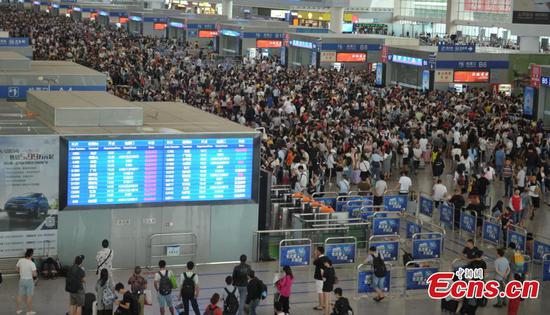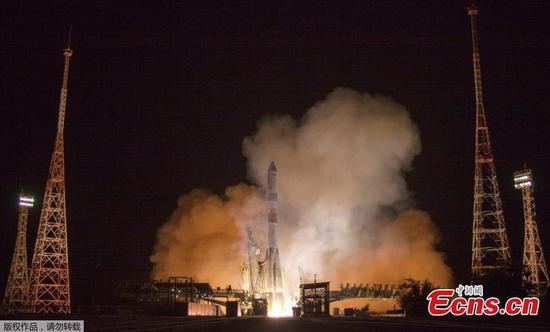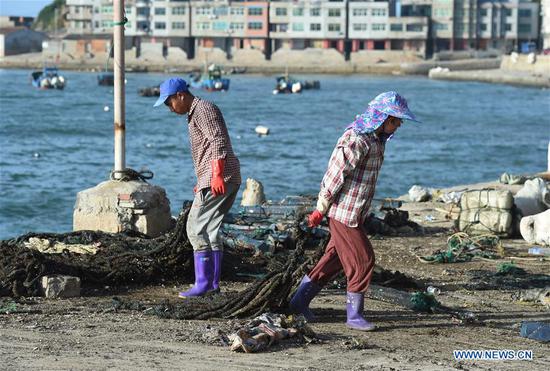China is capable of dealing with the gap caused by reduced purchases of U.S. soybeans amid the current trade friction and will find other sources, industry insiders said on Wednesday.
China has imposed tariffs on U.S. soybeans, so there will be a sharp reduction in imports, but other sources are available, an unnamed expert from the National Grain and Oil Information Center was quoted as saying in the official People's Daily on Wednesday.
As part of countermeasures against U.S. tariffs, China imposed tariffs of 25 percent on American soybeans, which took effect on Friday. This will raise import costs by 700 yuan to 800 yuan ($104.9 to $119.9) per ton, so domestic companies will cut their purchases from the U.S., the expert noted.
Soybeans can be used to produce edible oil and grease and as an ingredient for animal feed.
"Brazil is already China's largest supplier of soybeans, and Chinese imports of Brazilian soybeans will increase significantly as a result of the tariffs on U.S. imports," Rajiv Biswas, APAC chief economist at IHS Markit, told the Global Times on Wednesday.
Also, as some forms of oilseeds can also be used as substitutes for soybeans, there could be some switching toward other crops such as palm oil products, he noted.
"China has been importing too large a quantity of soybeans from overseas markets since 2012, and our feed formula could be adjusted to reduce consumption of soybeans," Ma Wenfeng, a senior analyst at Beijing Orient Agribusiness Consultancy, told the Global Times on Wednesday.
China aims to cut soybean imports from 2018 to 2019, the first reduction in 15 years, domestic agriculture commodities website ncpqh.com reported in May, citing the Ministry of Agriculture. The import volume was forecast to decline 0.3 percent year-on-year during this period, to 95.65 million tons, but imports from Brazil are expected to reach a record high.
Some provincial governments have released measures to boost local soybean production in recent months. China's northeastern provinces of Heilongjiang and Jilin have rolled out subsidies to encourage farmers to grow more soybeans, media reports said, with Heilongjiang set to increase the soybean cultivation area by 5 million mu (333,333 hectares).
Reduced dependence on U.S. soybeans will also help the domestic industry, said Li Shihua, a farmer based in Harbin, Northeast China's Heilongjiang Province. "Although imported soybeans have a high oil yield, this trade tension will force us to upgrade our technologies to meet growing domestic demand," Li told the Global Times on Wednesday.
U.S. farmers worried
The trade friction ignited by the Trump administration is worrying some U.S. farmers. The U.S. Soybean Export Council said it disagreed with resolving trade disputes by imposing tariffs, and the Chinese market is very important for the American soybean industry, according to a statement it sent to the Global Times on Wednesday.
"A trade war will end up with a no-win situation, and we do not want to see damage to the mutually beneficial cooperation between the U.S. soybean industry and China's livestock and poultry aquaculture, feed industry and soybean processing industry over the past 36 years," the council noted.
Brazil surpassed the U.S. to become China's largest soybean supplier in 2017, exporting 50.93 million tons - 53.3 percent of China's total soybean imports - according to Chinese customs.
"There's no fundamental difference between U.S. and Brazilian or Argentinean soybeans," Ma said, noting that the trade tension will ultimately hurt U.S. farmers as China seeks replacements.
State-owned grain trader Sinograin said it has not procured any soybeans from the U.S. since April, and has shifted its focus toward South America, according to People's Daily.
As soybeans are one of the U.S.' main exports to China, the situation will be a heavy blow for U.S. soybean farmers and it could create a political backlash in some key states ahead of the U.S. midterm elections in November, Biswas said.


















































